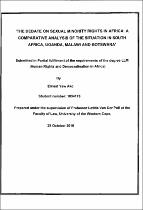| dc.description.abstract | Gays, lesbians,2 and laws that criminalise homosexuality3 in Africa have been the subject of heated
public debate in recent times.a Criminalisation and attempts at re-criminalisation of homosexuality in
some African countries have generated a lot of debate on the issue.s The central theme in these
debates has been the justification and maintenance of sodomy laws, as against the argument for
the repeal of these laws because it violates the rights of gays and lesbians.
According to Human Rights Watch, more than 80 countries in the world criminalise consensual
same sex sexual activity between adults in private.6 lt is estimated that there are about 38 countries
that criminalise homosexuality in Africa, accounting for almost half of the countries that criminalise
homosexuality in the world. The sodomy laws in many African countries were inherited from the colonial masters of these
countries.s The provisions in the Penal Codes of Botswana,e Malawilo and Uganda" were inherited
from the British, who colonised these countries. Uganda has made attempts at re-criminalising
homosexuality with the death penalty as the maximum penalty for'aggravated homosexuality'.12
The ramifications of these sodomy laws for the rights of gays and lesbians in Africa have been very
grave. Gays and lesbians in Africa have been subjected to hate speech, harassed by police and
civilians, physically assaulted; and in some instances remanded in prison custody for indefinite
periods, convicted, or even murdered.lt Even after their deaths, there is still violence against sexual
minorities.la
Separate considerations or a combination of them may motivate the verbal and physical attacks on
gays and lesbians, but it is submitted that even though the non existence of sodomy laws in a
country does not guarantee the protection of sexual minority rights, the existence of sodomy laws
embolden'perpetrators' to launch these attacks.
As stated earlier, there are two diametrically opposed view points on the debate. One school of
thought thinks that homosexuality should be criminalised and supports sodomy laws. Some even
think that the current sodomy laws that exist in their countries are not punitive enough and support
calls for re-criminalisation of homosexuality.ls The other school of thought maintains that sodomy
laws violate the rights of sexual minorities and are a violation of the international obligations of
countries that maintain these laws.' Four countries have been selected as the focus of this study. Malawi, Uganda, and Botswana have
a colonial inheritance of sodomy lawsl7 that have generated some debate for varied reasons.
Botswana and Malawi have invoked their laws in cases before their courts.'8 Uganda has made
attempts at re criminalising its 'sodomy' laws and has also attracted some amount of debate. These
countries are not the only 'hot spots' of the homosexual debate in Africa, but they are examples of
recent developments that offer an interesting insight into the debate.
South Africa is the fourth country. lt brings an interesting aspect to the debate as well, which may be
of relevance to contrast with what pertains in the three other countries above. South Africa
recognises the rights of sexual minorities and offers them protection in its constitution.le South
Africa's history, which is different from that of the three countries, may have informed this situation,
but the interest in South Africa is not so much of its history but the comprehensive jurisprudence and
debate it has generated over the years.2o
This study makes no pretence at settling this debate but hopes to contribute to it by unpacking the
arguments of both sides in the light of international human rights law, and makes suggestions on the
way forward. | en_US |

